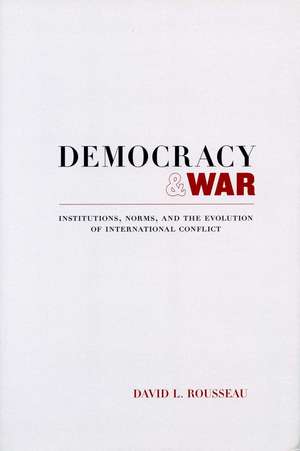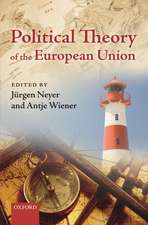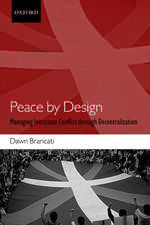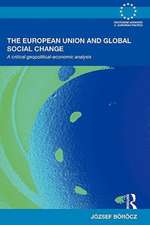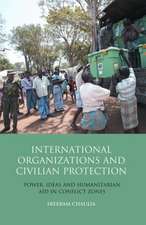Democracy and War: Institutions, Norms, and the Evolution of International Conflict
Autor David Rousseauen Limba Engleză Hardback – 23 mar 2005
Conventional wisdom in international relations maintains that democracies are only peaceful when encountering other democracies. Using a variety of social scientific methods of investigation ranging from statistical studies and laboratory experiments to case studies and computer simulations, Rousseau challenges this conventional wisdom by demonstrating that democracies are less likely to initiate violence at early stages of a dispute. Using multiple methods allows Rousseau to demonstrate that institutional constraints, rather than peaceful norms of conflict resolution, are responsible for inhibiting the quick resort to violence in democratic polities. Rousseau finds that conflicts evolve through successive stages and that the constraining power of participatory institutions can vary across these stages. Finally, he demonstrates how constraint within states encourages the rise of clusters of democratic states that resemble "zones of peace" within the anarchic international structure.
Preț: 563.77 lei
Preț vechi: 696.00 lei
-19% Nou
Puncte Express: 846
Preț estimativ în valută:
107.88€ • 117.55$ • 90.90£
107.88€ • 117.55$ • 90.90£
Carte tipărită la comandă
Livrare economică 23 aprilie-07 mai
Preluare comenzi: 021 569.72.76
Specificații
ISBN-13: 9780804750813
ISBN-10: 0804750815
Pagini: 408
Dimensiuni: 152 x 229 x 28 mm
Greutate: 0.59 kg
Ediția:1
Editura: Stanford University Press
Colecția Stanford University Press
ISBN-10: 0804750815
Pagini: 408
Dimensiuni: 152 x 229 x 28 mm
Greutate: 0.59 kg
Ediția:1
Editura: Stanford University Press
Colecția Stanford University Press
Recenzii
"David Rousseau's Democracy and War advances substantially the scholarship on the democratic peace. Rousseau demonstrates, using both advanced statistical and sophisticated qualitative methods, that institutional constraints, rather than normative conditions, mitigate the initiation of conflicts by states, and democracies have these institutional constraints in particularly great abundance. Rousseau also develops new measures of domestic constraints on national leaders, thus helpfully supplementing the range of measures that scholars now can employ in quantitative studies of conflict and other elements of international affairs." —Joseph Grieco,Department of Political Science, Duke University
Notă biografică
David L. Rousseau is Assistant Professor of Political Science, University of Pennsylvania.
Textul de pe ultima copertă
“David Rousseau's Democracy and War advances substantially the scholarship on the democratic peace. Rousseau demonstrates, using both advanced statistical and sophisticated qualitative methods, that institutional constraints, rather than normative conditions, mitigate the initiation of conflicts by states, and democracies have these institutional constraints in particularly great abundance. Rousseau also develops new measures of domestic constraints on national leaders, thus helpfully supplementing the range of measures that scholars now can employ in quantitative studies of conflict and other elements of international affairs.” —Joseph Grieco,Department of Political Science, Duke University
Descriere
Conventional wisdom in international relations maintains that democracies are only peaceful when encountering other democracies. Using a variety of social scientific methods of investigation ranging from statistical studies and laboratory experiments to case studies and computer simulations, Rousseau challenges this conventional wisdom by demonstrating that democracies are less likely to initiate violence in early stages of disputes.
